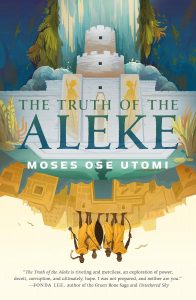Jake Casella Brookins Reviews Truth of the Aleke by Moses Ose Utomi
 The Truth of the Aleke, Moses Ose Utomi (Tordotcom 978-1-2508-4905-2, $24.99, 112pp, hc) March 2023. Cover by Alyssa Winans.
The Truth of the Aleke, Moses Ose Utomi (Tordotcom 978-1-2508-4905-2, $24.99, 112pp, hc) March 2023. Cover by Alyssa Winans.
Among the more fascinating things that Moses Ose Utomi seems to be doing with his Forever Desert series is looking at how worldviews change with experience. The protagonist of The Lies of the Ajungo, a young teenage boy, cut through the titular deception with a heroic self-sacrifice. Generations later, we meet Osi, the protagonist of The Truth of the Aleke: a bit older, and living in a world that doesn’t reduce so neatly.
A teenage Peacekeeper, one of the many sworn to protect their city from the attack of a cruel warlord – the Aleke – and his cultists, Osi is unexpectedly promoted to the most elite rank after he survives a devastating assault. Trained in the use of ‘‘God’s Eyes,’’ talismans that grant magical abilities and remarkable martial prowess, he joins the city’s most accomplished champions on a journey across the desert to face the Aleke on his own turf. Once there, however, Osi discovers that the history he was taught is a tangle of lies and deceptions, and the revelations don’t stop there.
While The Lies of the Ajungo had a simpler, almost fable-like construction; The Truth of the Aleke is more complicated, less definite. It’s an interesting change at the very sentence level: Although there is still something of an omniscient, oral tone to the narrative, this feels much less like a tale for children, more like one for a young adult. Osi is at the beginning of a political consciousness, an awareness that the world is more complex than a fable and that stories and histories themselves can be tools of manipulation and oppression.
I’m not quite sure how he does it, but Utomi somehow makes his action sequences and magic systems flow quite seamlessly within this ever-more-realistic story. The graphic violence of the action resonates with both the bloody motifs of the story and the real-world atrocities they gesture towards: Parts of the Forever Desert remind me of the horrors of the Belgian Congo, for example. And yet, Utomi still infuses his magically enhanced fight scenes with exuberance, an almost anime-like exaggeration of power; though these books are quite different in scope, some of the action sequences here reminded me of the superb fight scenes in Fonda Lee’s Green Bone Saga. Part of the maturation of this second volume is how Osi comes to see the aftermath of violence as much as its moment, and in how survival – after an injury, after a defeat – is centered as part of life. Where The Lies of the Ajungo has an abruptness to its battles and its revelations that in some measure preserves its protagonist’s naivete, The Truth of the Aleke gives time and space for Osi to reconsider after its climactic moments, time to grapple not just with power and truth but with consequences.
In keeping with the more complicated political framework, The Truth of the Aleke also has a more complicated metaphorical structure than its predecessor. Although the major symbols from the first volume are still in evidence – a focus on water, iron, and power, often paired with the trinity of speech, hearing, and sight – they’ve been somewhat obscured, made less simple and totemic. The more resonant image here is a game, ‘‘Move Water Move,’’ that Osi learns from an old man in the Aleke’s city. A bit like a rotating mancala, the game seems to show Osi how historical gains and losses can play out unpredictably; more cynically, it demonstrates how the battles of the righteous and the well-intentioned can turn into victories for other parties altogether.
It’s fascinating to see a fantasy world change so radically in its realism like this, as though it’s growing with its protagonists’ ability to see it. There’s still some ways to go – elements of the world still have a fairytale-like simplicity – but it seems to be developing quite organically from a fable to a more concrete reality. There’s an immense amount of sadness in The Truth of the Aleke, of youthful optimism betrayed, of fantastical powers twisted to oppressive ends. But it’s also open-ended, wiser, and, it seems, with more to come.
Jake Casella Brookins is from the Pennsylvania Appalachians, and spent a fantastic amount of time in the woods. He studied biology, before switching over to philosophy & literature, at Mansfield University. He’s been a specialty coffee professional since 2006. He’s worn a lot of coffee hats. He worked in Upstate New York and Ontario for about 8 years. He’s been in Chicago since 2013; prior to the pandemic, he worked for Intelligentsia Coffee in the Loop. Starting in 2021, he’s been selling books at a local indie bookstore. He lives with his wife, Alison, and their dogs Tiptree & Jo, in Logan Square.
This review and more like it in the March 2024 issue of Locus.
 While you are here, please take a moment to support Locus with a one-time or recurring donation. We rely on reader donations to keep the magazine and site going, and would like to keep the site paywall free, but WE NEED YOUR FINANCIAL SUPPORT to continue quality coverage of the science fiction and fantasy field.
While you are here, please take a moment to support Locus with a one-time or recurring donation. We rely on reader donations to keep the magazine and site going, and would like to keep the site paywall free, but WE NEED YOUR FINANCIAL SUPPORT to continue quality coverage of the science fiction and fantasy field.
©Locus Magazine. Copyrighted material may not be republished without permission of LSFF.






